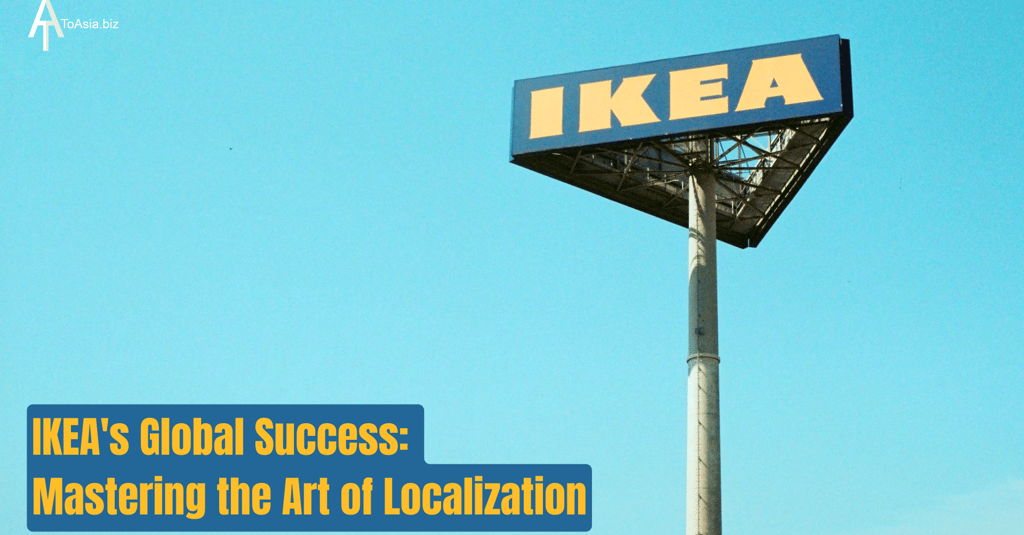Ikea Business Success Strategy: Localization
CASE SHARING
River Chan
1/23/20245 min read


Does Ikea use Localization strategies?
IKEA, the world’s leading furniture brand, has achieved global dominance, thanks in part to its savvy localization strategies.
IKEA’s success is attributed to a mix of standardization and localization.
While maintaining a consistent brand image and store layout globally,
IKEA pays close attention to local trends, cultures, and customer preferences.
This approach involves extensive research, including home visits and interviews with thousands of people in each new market.
Ikea founded by Ingvar Kamprad in 1943, IKEA began as a small-scale mail-order business in Sweden and rapidly expanded internationally.
The first store opened in 1958 in Sweden.
Does Ikea operate in Asia? What are their international business expansion strategies?
By the 1970s and 1980s, IKEA embarked on an aggressive Asia business expansion, opening stores in Japan, Australia, China, Hong Kong etc.
IKEA launched its largest store in the world in South Korea in 2014, aiming to attract the country's small households with its vast array of home furnishing solutions.
IKEA expanded its global footprint by opening the world's largest store in the Philippines in 2021, marking a significant step in its international growth strategy.
This strategic move into the Philippine market reflects Ikea's ambition to tap into the growing demand for affordable home furnishing solutions in Southeast Asia.
Ikea International Business Expansion Strategies - Localization Strategy in China
IKEA's approach in China showcases a deep commitment to blending global brand values with local cultural nuances, reflecting a sophisticated localization strategy.
By 2023, IKEA boasts 37 stores across China, including specialty formats like shopping malls, a city store, and experience shops and convenient storefronts closer to urban centers within cities signifying its expansive retail footprint tailored to the Chinese market.
The launch of the "Home Experience of Tomorrow" store in Shanghai symbolizes IKEA's forward-thinking, focusing on innovative design and interactive customer experiences to match the concept of 'new retail'.
IKEA has embraced an omnichannel approach, leveraging popular platforms like WeChat, mobile apps, and Tmall to cater to China's e-commerce affinity.
Additionally, IKEA's integration of local culinary preferences into its cafeteria menus, by serving dishes like dim sum in Guangdong and Sichuanese hotpot offering regional dishes alongside Swedish favorites, further cements its status as a retailer deeply embedded in the fabric of Chinese society, exemplifying a model of global retail success through meticulous market adaptation and customer engagement.


Ikea International Business Expansion Strategies - Localization Strategy in India
IKEA delayed its entry into India due to regulatory restrictions and market risks. Also, they had conducted thousands of home surveys across India before opening a store there.
In 2018, IKEA invested $150 million in opening its first store in Hyderabad, India, adapting its products, pricing, and menu localization strategy to suit local preferences and cultural practices.
This includes customizing cutlery options to cater to the predominant use of spoons over forks, reflecting Indian dining habits.
Due to the fact in lower-income families, IKEA introduced extendable beds catering to the common practice of children sharing beds with their parents in their formative years.
In the cafeteria, IKEA adapted its menu to respect the dietary restrictions of India's Hindu and Muslim populations by offering alternatives to beef and pork, such as chicken meatballs and a variety of vegetarian options.
This nuanced approach demonstrates IKEA's dedication to understanding and integrating into the Indian market.
Ikea Japan: Learning from Past Mistakes
IKEA first entered Japan in 1974 but withdrew in 1986 due to cultural misunderstandings and unsuitable product sizes.
However, IKEA returned in 2006 with a revised strategy, incorporating market-specific adjustments, enhanced customer experiences, and localized showrooms.
IKEA's Tokyo store, for example, features small rooms furnished to resemble typical Japanese homes, displaying local cooking appliances and tatami flooring.
Ikea Japan: Embracing Local Cultural in Store Openings
In Japan, IKEA's approach is finely tuned to local culture and consumer behavior.
After learning from its initial failure in the 1970s, IKEA returned with a business model that resonates with Japanese preferences.
This includes offering services like home delivery and assembly, showcasing products suited to smaller living spaces, and creating showrooms that reflect the typical Japanese home.
IKEA also focuses on customer experience and cultural integration, which is evident in their latest store promotions.
For the grand opening of the new store in Maebashi, Gunma Prefecture, IKEA Japan has undertaken a unique promotional campaign.
They collaborated with Keiichi Arawi, the creator of the popular manga "Nichijou" and a native of Gunma Prefecture, to design promotional imagery.
This campaign is a clever nod to local culture and art, celebrating Arawi's work and its roots in Gunma.
The promotional images are featured not only on IKEA's website and in the media but also on billboards outside the physical store.
This localized approach is not just a celebration of a new store opening; it's a tribute to the local culture and a nod to the fans of "Nichijou" in Gunma, enhancing the connection between the brand and the local community.
IKEA's strategy in Japan exemplifies the importance of cultural sensitivity and local engagement in international business.
By blending its global brand with local preferences and cultural icons, IKEA Japan can create a unique and appealing shopping experience that resonates with its customers.
Ikea International Business Expansion Strategies - Marketing and Digital
IKEA’s marketing strategy, emphasizes “glocalization,” reflecting local cultural, social, economic, and linguistic factors.
IKEA’s advertisements example in China connect common hobbies and lifestyles to their furniture, illustrating their understanding of the local market.
In terms of digital presence, IKEA has effectively utilized online shopping services, social media, and micro-blogging for marketing campaigns, adapting to the fast-paced digital environment.
Ikea International Business Expansion Strategies - Success Through Localization
IKEA’s journey from a small-scale business to a global furniture powerhouse showcases the importance of localization in international business.
By adapting to local cultures, consumer preferences, and market conditions, IKEA has successfully established itself in diverse markets across the globe, demonstrating the power of strategic localization in global business expansion.
With over 50 years of experience combined with our team at ToAsia.biz, we are ready to provide business consultation services to lead your business into the Asia Pacific region - profitably.
For more detailed Asia business insights and Asia Market Entry Strategies, connect with our team and see how our playbook is different from other business consultants out there where our focus is to help you expand at the right pace, staying lean and profitable.
IKEA's International Business Expansion Strategies: Weaving Localization into Global Expansion
IKEA stands as a paragon of localization, blending universal brand principles with a keen sensitivity to local tastes and living conditions.
This dual strategy is rooted in deep market immersion—research teams visit thousands of homes near each new store to gather firsthand insights into the daily lives, needs, and financial limitations of potential customers.
Such meticulous research informed over a thousand home visits in India alone, paving the way for products and experiences finely tuned to each locale's unique culture, from product design to store placement and culinary offerings.


Image Source: Ikea India
Related Asia business insights and blogs that you may also like:
Uniqlo: The Symphony of Innovation, Quality, and Customer Focus
Decoding India: Cultural Insights for Business Success
McDonald International Business Marketing Strategy: Localization
The Secret Behind Netflix's Localization Strategy for Global Dominance


River Chan is the marketing director of ToAsia.biz with over 10 years of experience in marketing from strategic planning, project execution, and data analysis across different industries.
About Author
Copyright © 2026 ToAsia.biz


We lead your business to Asia
Our Business Growth Experts help SaaS businesses achieve growth in Asia and become profitable FAST.
Send us a message via WhatsApp
